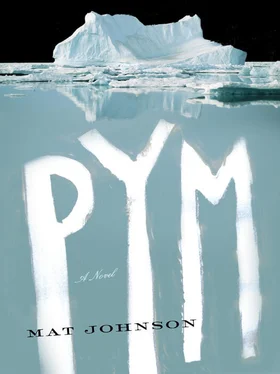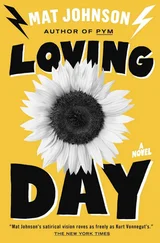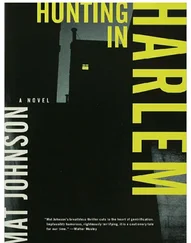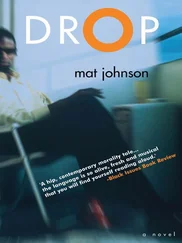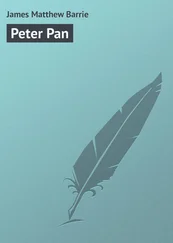“See, that’s what I been talking about. That’s brilliance.” Garth took to his knees too, gathering some of the stream’s water in his hands. Thomas Karvel’s palms went to Garth’s shoulders, blessing.
“A man who lives a life worth living, he’s a hunter. He hunts for something, he hunts for his dream. And his dream is always the same thing: to create a world he can truly live in, without Big Brother enslaving him to mediocrity. So I created this free land. First within my art, and now in life,” Karvel said, motioning grandly around him, the king of all we could survey. “Had to come down here to do it too. As blank as the morning snow. A clean canvas. A place with no violence and no disease, no poverty and no crime. No taxes or building codes. This is a place without history. A place without stain. No yesterday, only tomorrow. Only beauty. Only the world the way it’s supposed to be.”
“This river tastes like grape Kool-Aid!” Garth exclaimed, staring at the bit left in his cupped fingers in disbelief.
“Yeah, but with Splenda instead of the real stuff. I tried to use corn syrup, but it killed all the damn koi.”
The cottage we were to stay in was the adjective quaint made manifest. At least from the outside. With a real thatched roof and stone façade, it seemed as if it had been sitting there for centuries. Even from a distance, I could see that the windows bore the distorted surfaces of handblown glass, the candlelight flickering behind each one running beautifully along their imperfect surfaces.
“That’s Lamplight Brook. ” Garth turned to me, as if this was supposed to mean something.
“That’s right. This was the original model I used to paint it. Bought it with the money from that painting. I had it removed stone by stone from Bourton-on-the-Water, in England. Took them thirteen months, four jet trips to fly it down. No expense was spared.”
This last part was not entirely true. While the outside of this house indicated that we might find a plush and comfortable household just beyond its threshold, what I found instead when I entered was just an empty shed. The floor itself seemed to be original, the wood beams were wide and old and well worn, but there was not much else in this space besides them. Gas-fueled “candles” hid just below the windows, as did some sort of piped device that hummed so loudly I could feel the vibrations through my bare feet, but no furniture. Our interior tour revealed that this house had no back. After only ten or twelve feet, the building ended abruptly at the metal wall of the BioDome, giving the impression that God was cutting the building in half with his knife. Worse still, that knife seemed to have cut off the part of the Lamplight Brook that contained the bathroom.
“You can stay here. I’ve got some packing material you can use for mattresses. It ain’t much, but you’ll fix it up.”
“Don’t worry about us, we’ll be fine, Mr. Karvel, sir. We are taken care of, don’t you worry,” Garth gushed, ensuring I could make no statement to the contrary, not even “Where do I take a crap?”
“Good, good. Well, the tools are in the back. You might as well take that patch of land past the cottage; I can’t see that from my place. Need anything, you just holler, ’kay boys?”
“What tools?” I asked as soon as Karvel had fully departed. I saw him walk down the path toward his quarters, pausing to snap an orchid off a low hanging branch on the way. What was that made of? I wondered. Mars bars?
“Well, they have a food budget, don’t they? So when I first got here I promised we’d do some vegetable gardening. You know, to cover what we’re going to eat, in addition to just helping out around the place.”
“What else did you tell him? Did you tell him about the others?”
“Told him we were working for a corporation harvesting water. He liked that. I left out the snow monkey part. You want him to know that, you tell him.”
“Good. I really don’t think this guy’s prepared for a Negro invasion,” I said. Garth’s head cocked to the side as if yanked.
“You can’t help yourself, can you? The man takes us in. Feeds us. Almost clothes us. And there you go with the racism talk.”
“Just because someone’s not scared of minorities, doesn’t mean they want to be one.”
Outside our window, Karvel paused on his walk to pull another pink orchid from the low-hanging branch of a cypress tree. Then he put the flower in his mouth and chewed.

It took most of the next three days to clear out the patch of vegetation to the far side of Lamplight Brook cottage. It was difficult to define a “day,” really, because the sun was always setting §in Karvel’s world. It did get a bit dimmer at “night,” though, and this helped our well-earned hours of sleep. It was hard, muscle-aching work. I needed all the rest I could steal.
It wasn’t that the roots of the plants were particularly deep, or that the soil was particularly hard, it was just that there was a lot of it. The spot we cleared was nearly half the size of a basketball court, and the removed flora was strewn as high as the three-fifths of a house we were living in. Still, we took great care to keep the roots of our transplants intact, and the majority of the greenery was still living. I was in shock those first days, I even knew at the time, reeling from the trauma of the past weeks and the oddity of the present. But it felt good to work, to focus on my hands instead of my mind. To not be a freeloader on someone else’s land. I even started to tune the ever-present voices out. This habitat was so much a creation of our host that, in a Lockean sense, it was a relief to establish some form of ownership through our labor.
By the afternoon of the fourth day, Garth and I were finally prepared to stop the reaping of the aesthetic but useless flowers and begin sowing the vegetables and fruits we could live on. When Mrs. Karvel came by with our daily rations (Stove Top stuffing mix, Sylvia’s canned collard greens, and Spam) Garth made a point to show her our progress before she scuttled away as usual, making the request for the seeds we would need for the next stage in our victory garden. Mrs. Karvel seemed perpetually stressed, rarely out of motion any time I saw her. Standing still for a moment, without food or an emptied plate or a feather duster in hand, seemed almost a painful act for her.
“You gonna have to make that patch bigger, ain’t you?” she said, looking out at the rows of rich, dark earth we had uncovered. This comment came to me as a surprise, because I thought if anything we’d perhaps been overzealous.
“You want it bigger?” I muttered aloud, more out of shock than as an actual question.
“Honey, we ain’t got enough food to feed you. A few months, tops, but it ain’t like the cans in storage are breeding new ones,” she told us, leaning forward and dropping her voice as if her husband might hear us, as far away as he was. “This is the deal. Either you guys got to figure out a way to grow us all some new food or you tell me how the hell we can get out of this goddamn fish-bowl.”
* The culinary term “Welsh rabbit,” is of course a joke. A very old one as jokes go, dating back to the early eighteenth century. The joke, English in origin, was that the Welsh were either too poor or too stupid or too generally pathetic to have actual meat on their plates, so cheese grilled on toast was their delusional equivalent. The other version of this title, “Welsh rarebit,” is in fact a degradation of the original, a mishearing that was later adopted as a less offensive alternative. To little avail. In fact, the English so derided their neighbors to the west of the isle that in their language the very word Welsh became synonymous with substandard or imitation goods.
Читать дальше
